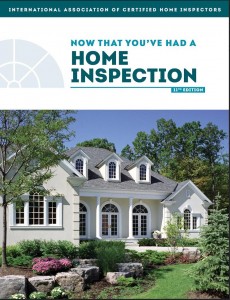Buyer's Inspection
A buyer's inspection is initiated by the home-buyer usually as a contingency to the final close of a real estate sale. These types of inspections are designed to assure that there are no hidden surprises for the purchaser. It is estimated that up to 80% of all home sales are contingent on the Buyer's Inspection! You'll be hard-pressed to find any real estate-related expert who doesn't adamantly suggest that you require an inspection prior to purchasing a home.
Seller's Inspection (Pre-Listing Inspection)
A seller's inspection is initiated by the property owner usually prior to listing the property. It helps the seller to determine what systems and structures of the property need repair. More importantly, it helps the seller and the seller's agent to accurately represent the home by disclosing damage to prospective buyers (which further helps to curb lawsuits). Damage discovered as a result of a seller's inspection can either be repaired by the seller (to maintain market value) or used as a negoting tool by both seller and buyer. Being used more and more, a Seller's Inspection is helping to speed-up the sales process. When sellers can show what damage an inspector found, and how that damage was fixed, the buyer's confidence may increases enough to move the transaction forward. But, the buyer should alway hire an their own inspector to perform another inspection to get a second-opinion.
Warranty Inspection
Home builders often initiate a "warranty" on a house for a period of one year or longer which is designed to cover the costs to repair systems and structural-related problems during the warranty period. A warranty inspection should be performed prior to the expiration of the home warranty contract so that you can address repairable issues with the builder while the warranty is in-force. Otherwise, you may be fully liable for the repair costs on your own should you allow the warranty to expire prior to discovering defects. Warranty inspections allow you to take full-advantage of the warranty's benefits which can save you from paying out-of-pocket for repairs that may otherwise have been the fault of the builder or OEM manufacturer. You've heard it before: "It broke just as soon as the warranty expired!" If anything, a Warranty Inspection holds builders, installers, suppliers, and manufacturers liable for their work and products. The few-hundred dollars you pay for a warranty inspection could very-well save you from having to hand-over thousands (or tens-of-thousands) of dollars for future repairs and new systems that were damaged before the warranty expiration!
New-Construction Inspection
A new-construction inspection is much like a warranty inspection except for the fact that the building and its systems are, in fact, new. Whereas a warranty inspection can apply to re-sale homes that offer a warranty, new-construction inspections are specifically designed for homes that have never been lived-in. Though new homes do not have the wear-and-tear on them that re-sale home may, various contractors associated with the construction may have made mistakes whether by accident or intentionally (such as taking "shortcuts" to finish the job faster or under-budget). A new-construction inspection provides you with an unbiased review by the inspector who acts as an objective and knowledgeable observer on your behalf to identify construction-related, code-related, and installation-related issues with home systems and structures. Many of the components from a home's system's and structure may be newly assembled, but they may also have been sitting in a lumber yard or warehouse for months. Also, even the best contractors make mistakes that could compromise the integrity of the job they do. It just makes sense to be sure!
Please don’t hesitate to contact me with any questions you may have.
 From Dashboard got to Appearance, then Widgets. Edit Footer 3. An inspection is just the start of keeping your home in good condition. With each inspection we offer a free book filled with home maintenance tips and other valuable information. Please
From Dashboard got to Appearance, then Widgets. Edit Footer 3. An inspection is just the start of keeping your home in good condition. With each inspection we offer a free book filled with home maintenance tips and other valuable information. Please